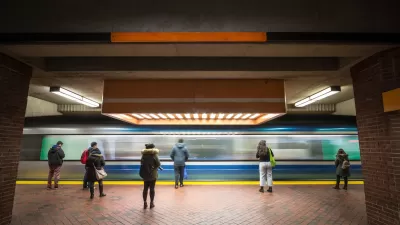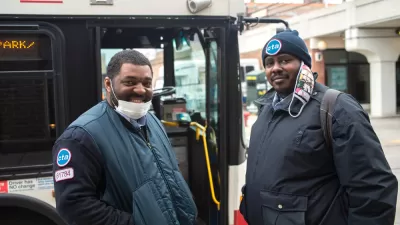Facing severe staffing shortages and high rates of burnout, transit agencies must improve their human resources departments and create healthier work environments to address current lapses in service.

A new report highlights major human resources shortcomings at transit agencies around the country that extend far beyond bus and train operator shortages to administrative and white-collar transit jobs, writes Kea Wilson in Streetsblog USA. “In a follow up to their much-discussed report on the national bus and train operator shortage, researchers at Transit Center dug into the structural factors behind the troubling ‘lack of people power’ happening at virtually every level of agency operations.”
Poor working conditions are driving many workers away, and almost half of workers are over the age of 55 and approaching retirement. “And even as agencies step up to help struggling riders with nowhere else to go and fix broken systems they didn't create, they're not always given extra resources to do it; they just stretch their budgets, and themselves, thinner and thinner,” Wilson adds.
Laurel Paget-Seekins, the primary author of the report, says this “cycle of exhaustion isn’t inevitable,” but that transit agencies must boost funding and resources for their HR departments and build a “strong foundation without which the sustainable transportation ecosystem can't possibly be expected to thrive, and without which many agencies are struggling to simply survive.”
FULL STORY: To Make Transit Work, We Need to Make Transit Agencies Better Workplaces

Manufactured Crisis: Losing the Nation’s Largest Source of Unsubsidized Affordable Housing
Manufactured housing communities have long been an affordable housing option for millions of people living in the U.S., but that affordability is disappearing rapidly. How did we get here?

Americans May Be Stuck — But Why?
Americans are moving a lot less than they once did, and that is a problem. While Yoni Applebaum, in his highly-publicized article Stuck, gets the reasons badly wrong, it's still important to ask: why are we moving so much less than before?

Using Old Oil and Gas Wells for Green Energy Storage
Penn State researchers have found that repurposing abandoned oil and gas wells for geothermal-assisted compressed-air energy storage can boost efficiency, reduce environmental risks, and support clean energy and job transitions.

Minneapolis Bans Rent-Setting Software
Four cities have enacted restrictions on algorithmic software that can inflate rent costs.

Oakland to Add 244 New EV Chargers
Oakland plans to launch its new charging network at eight locations by the end of 2025.

Jane Goodall Inspires with Message of Hope, Resilience, and Environmental Action
Speaking in Pasadena, Jane Goodall offered a hopeful and inspirational message, urging global compassion, environmental responsibility, and the power of individual action to shape a better future.
Urban Design for Planners 1: Software Tools
This six-course series explores essential urban design concepts using open source software and equips planners with the tools they need to participate fully in the urban design process.
Planning for Universal Design
Learn the tools for implementing Universal Design in planning regulations.
Heyer Gruel & Associates PA
City of Moreno Valley
Institute for Housing and Urban Development Studies (IHS)
City of Grandview
Harvard GSD Executive Education
Salt Lake City
NYU Wagner Graduate School of Public Service
City of Cambridge, Maryland





























